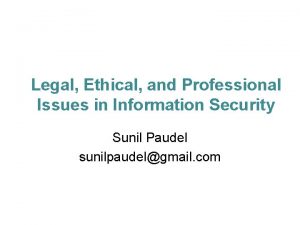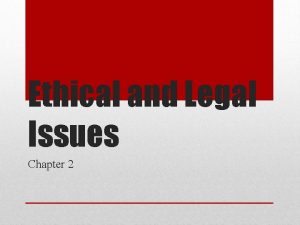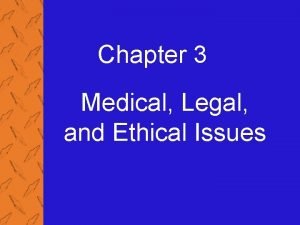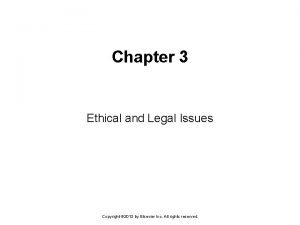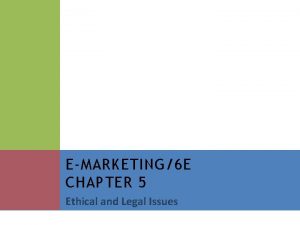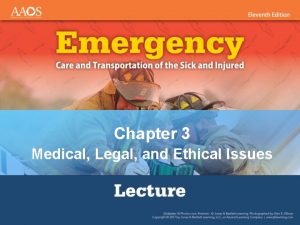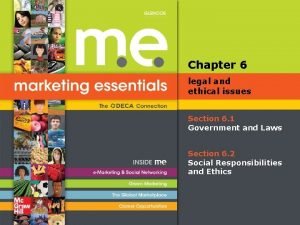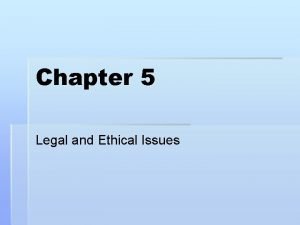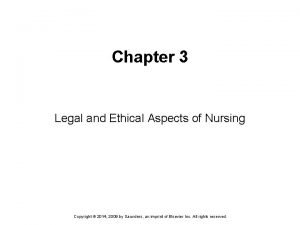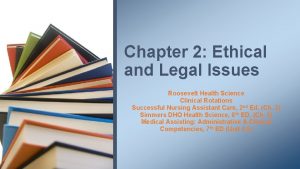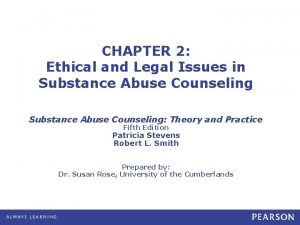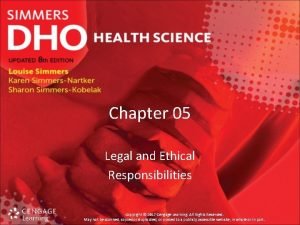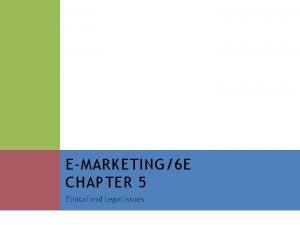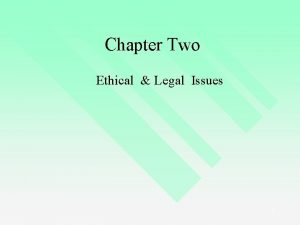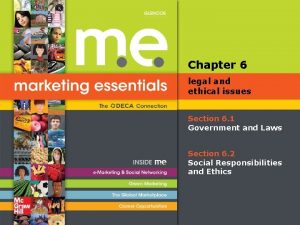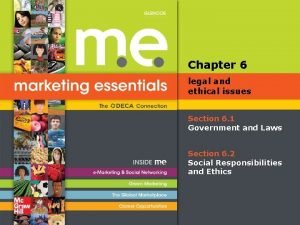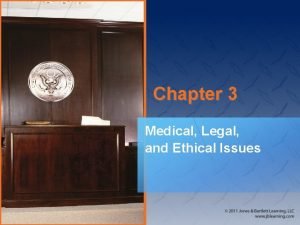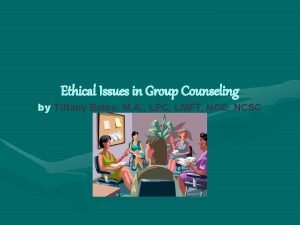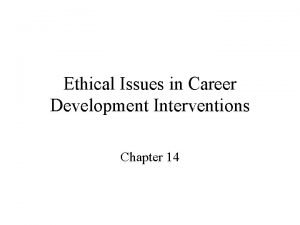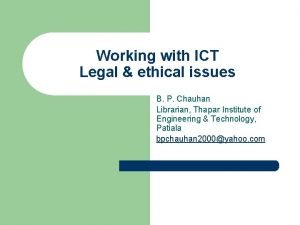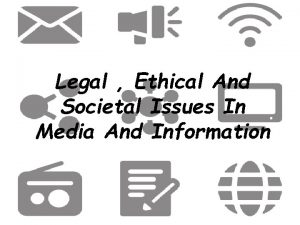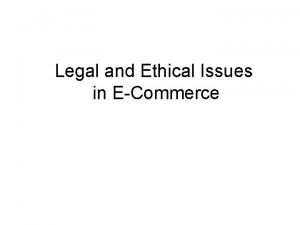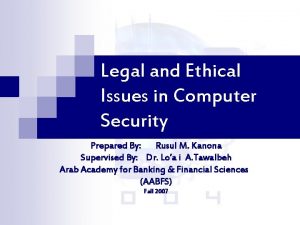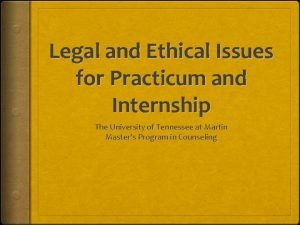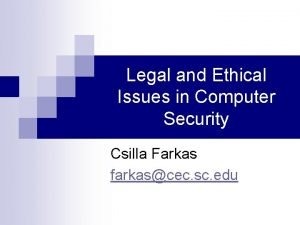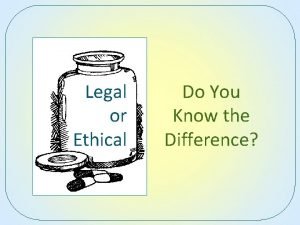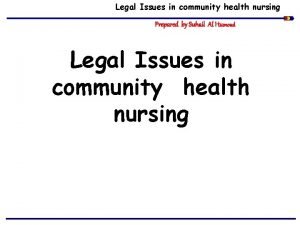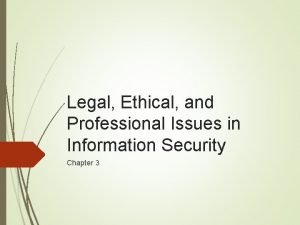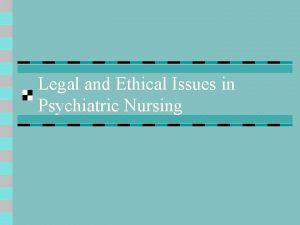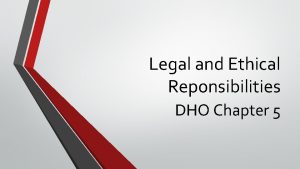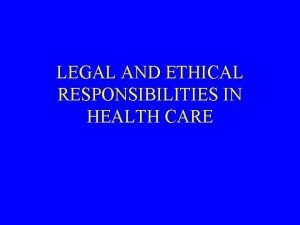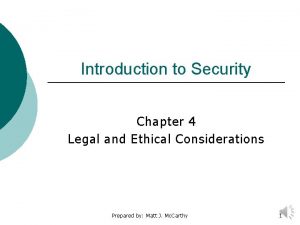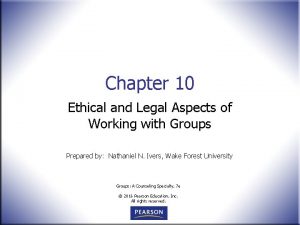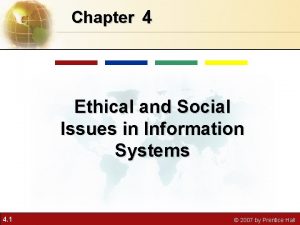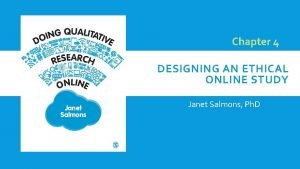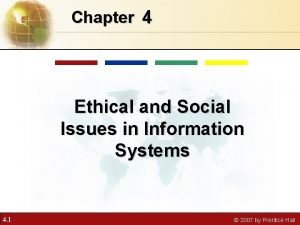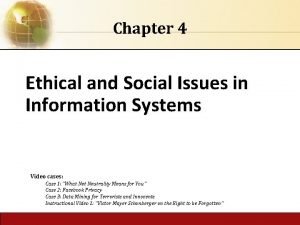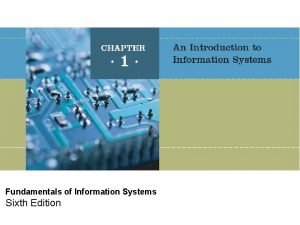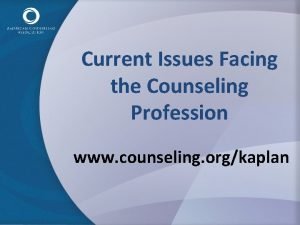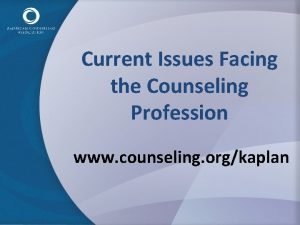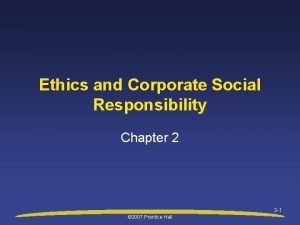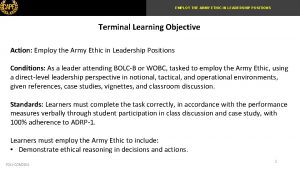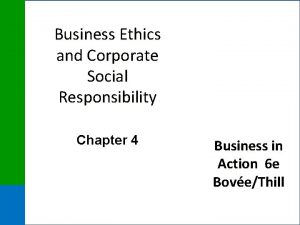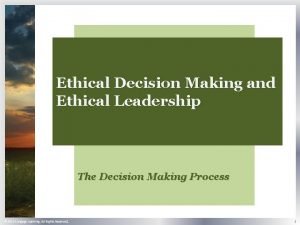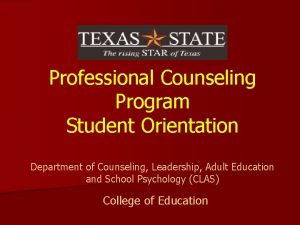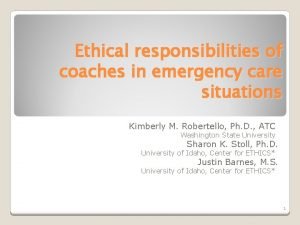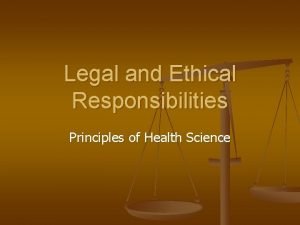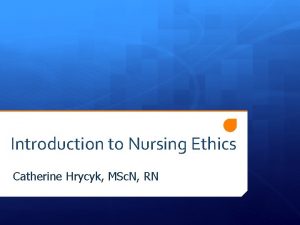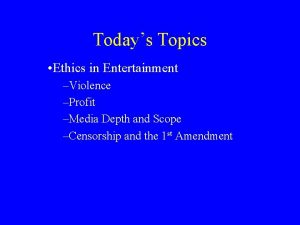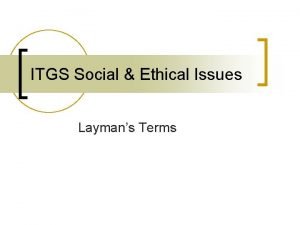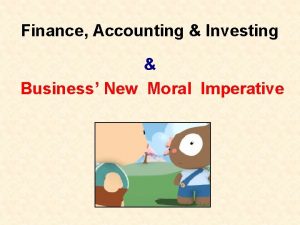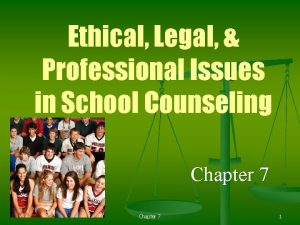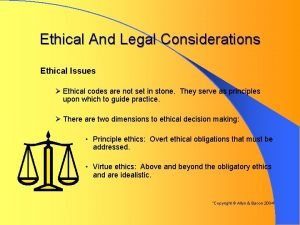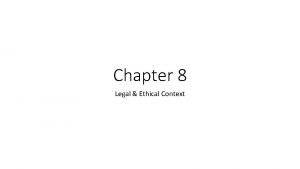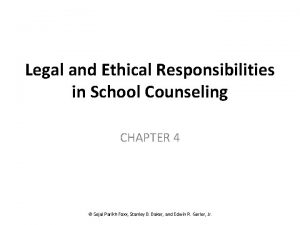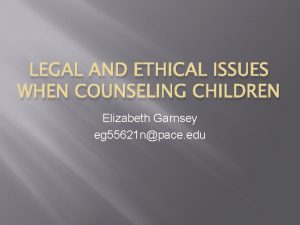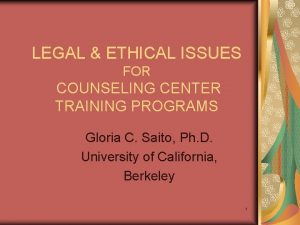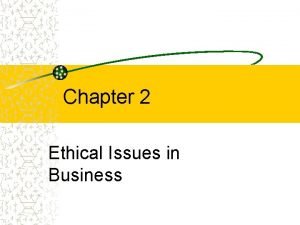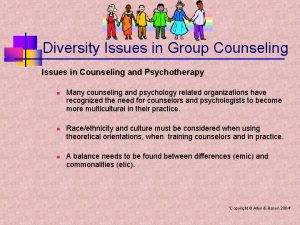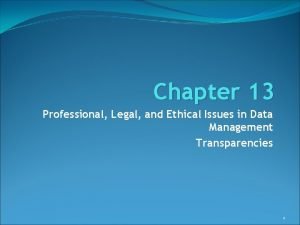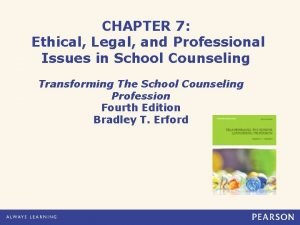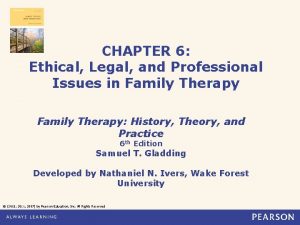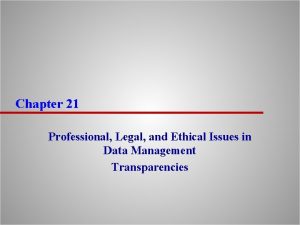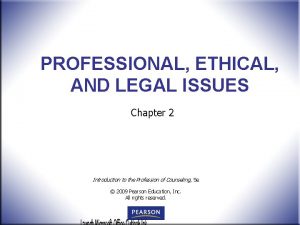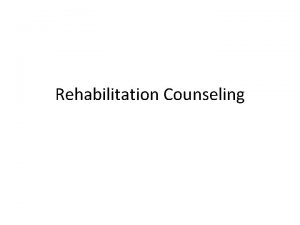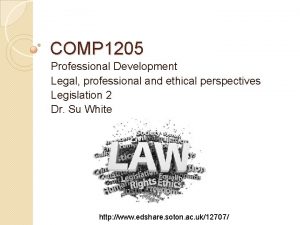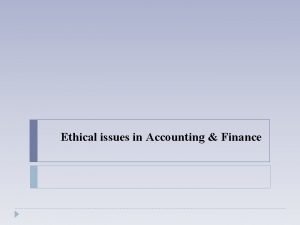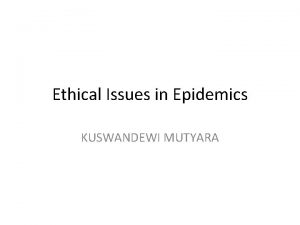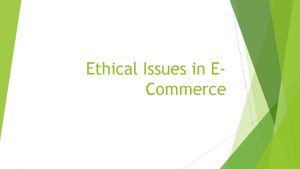Ethical Legal Professional Issues in School Counseling Chapter





















































- Slides: 53

Ethical, Legal, & Professional Issues in School Counseling Chapter 7 1

Professional Associations and Credentialing Organizations n n n A number of resources and sources of information are available that can help guide counselors as they strive to assist students in an ethical and legal manner. The professional associations for counselors have created ethical standards for professional behavior and provide a wealth of current information, resources, and training. Federal and state governments continually enact laws and regulations that affect counselors.

Professional Associations and Credentialing Organizations n n The American Counseling Association (ACA) is the professional association for all types of counselors (http: //www. counseling. org). ACA’s mission is to enhance the quality of life in society by promoting the development of professional counselors, advancing the counseling profession, and using the profession and practice of counseling to promote respect for human dignity and diversity. n ACA comprises 20 divisions, 50 state or affiliate branches, and 4 regions. n It influences all aspects of professional counseling through programs, committees, and functions n ACA has 15 committees, including an Ethics Committee which is responsible for answering questions about the Code of Ethics and investigating ethical complaints. n ACA’s Journal of Counseling & Development covers current research, professional practices, and other information valuable to the practicing counselor.

Professional Associations and Credentialing Organizations n n The American School Counselor Association (ASCA) is a semiautonomous division of the ACA and addresses school counseling issues. n It supports school counselors’ efforts to help students focus on academic, social-emotional, and career development so they achieve success in school and are prepared to lead fulfilling lives as responsible members of society. n It has local counseling association branches in nearly all 50 states. ASCA targets its efforts toward professional development, publications and other resources, research, and advocacy specifically for professional school counselors. n It publishes the journal, Professional School Counseling, six times a year, and a bimonthly magazine, The School Counselor.

Professional Associations and Credentialing Organizations n n The National Board for Certified Counselors (NBCC) began as a corporate partner of the ACA and is now an autonomous organization. n NBCC is the only national credentialing organization for professional counselors. n All other licenses and certifications are granted through state and local entities. The National Counselor Exam (NCE) must be passed as part of the process for becoming nationally certified. n The NCE is the exam usually required by state counseling licensure boards for professional counselor licensure.

Professional Associations and Credentialing Organizations n The Council for Accreditation of Counseling and Related Educational Programs (CACREP) also began as a corporate partner of the ACA and is now an autonomous organization. n CACREP is responsible for establishing state-of-the-art standards for counselor education programs. n CACREP standards address program objectives and curricula, faculty and staff requirements, program evaluation, and other requirements for accreditation. n Students who graduate from CACREP programs are usually in an advantageous position to be hired because their programs include 60 hours for programs accredited using the standards that became effective in 2016 and 700 hours of field placement.

Ethical Standards and Laws Standards Laws • Developed by professional associations to guide the behavior of a specific group of professionals. • More prescriptive. • Ethical standards serve the purposes of educating members about ethical conduct, providing a mechanism for accountability, and serving as a means for improving professional practice. • Carry greater sanctions or penalties for failure to comply. • Updated periodically to ensure relevance. • Based on generally accepted norms, beliefs, customs, and values. • Incorporated into a legal code • Because there are greater penalties associated with laws, counselors should follow the legal course of action if there is no harm to their clients.

ACA Code of Ethics n The ACA Code of Ethics (2014) is based on 6 moral principles: n Autonomy: Independence and the ability to make one’s own decisions. n Justice: Treating each person fairly, according to client needs. n Beneficence: Doing good or what is in the best interests of the client and society n Nonmaleficence: Doing no harm to others as well as growing as a counselor to provide the best services one can for clients. n Fidelity: Loyalty, faithfulness, and the honoring of commitments. n Veracity: Being truthful in professional interactions.

ACA Code of Ethics n n The ACA revises the ACA Code of Ethics at least every 7 -10 years. The 7 th and most recent revision became effective in March 2014. n A new section was added, which specifically addresses distance counseling, social media, and technology issues. n Addressed issues such as, at what point does someone become a client, when may a counselor refer a client or terminate counseling, the role of values in counseling, and clarity regarding how counselors think about our relationship with our clients.

ACA Code of Ethics • The 2014 ACA Code of Ethics serves 6 main purposes: 1. Sets forth the ethical obligations of ACA members and provides guidance intended to inform the ethical practice of professional counselors. 2. Identifies ethical considerations relevant to professional counselors and counselors-in-training. 3. Enables the association to clarify for current and prospective members, and for those served by members, the nature of the ethical responsibilities held in common by its members. 4. Serves as an ethical guide designed to assist members in constructing a professional course of action. 5. Helps support the mission of ACA. 6. Serves as the basis for processing inquiries and ethical complaints concerning ACA members.

ACA Code of Ethics • The ACA Code of Ethics (2014) is divided into nine areas: A. The Counseling Relationship B. Confidentiality and Privacy C. Professional Responsibility D. Relationships with Other Professionals E. Evaluation, Assessment and Interpretation F. Supervision, Training and Teaching G. Research and Publication H. Distance Counseling, Technology, and Social Media I. Resolving Ethical Issues

Section A: The Counseling Relationship n n Section A covers all areas related to the nature of the relationship with clients. Professional counselors must always put the best interests of their clients first and ensure that clients understand the extent and limitations of counseling. Counselors must avoid imposing their personal values and may not refer a client based on any of the counselor’s personally held beliefs, values, or behaviors. Emphasis is continued on critical issues, including general client welfare and avoiding harm, appropriate termination of services, fees and bartering, and informed consent.

Section B: Confidentiality and Privacy n n Section B covers all areas related to the confidentiality rights of clients and discusses the limits to confidentiality. Subtopics include: n Multicultural/diversity considerations n The client’s right to privacy n Confidentiality when working with groups and families n Working with minor or incompetent clients n All aspects of record keeping n Case consultation Changes included reinforcing the confidential nature of records kept in any medium (written, electronic or otherwise) and the need for counselors to keep records as appropriate to their practice.

Section C: Professional Responsibility n Section C continues to place emphasis on issues such as: n Facilitating access to counseling services n Practicing in a nondiscriminatory manner n Professional competence n Advertising and soliciting clients n Professional qualifications n Public responsibility n Adhering to the ACA Code of Ethics (2014)

Section D: Relationships with Other Professionals n Section D stresses the importance of interactions and relationships between counselors and other professionals. n Professional counselors should become knowledgeable about their colleagues and develop positive working relationships and communication systems. n Professional counselors often may be part of interdisciplinary teams. n Professional counselors are reminded to be respectful of differing approaches to counseling services and the traditions and practices of other professional groups.

Section E: Evaluation, Assessment, and Interpretation n Section E covers standards related to the assessment of n n clients, the counselor’s skills, and the appropriateness of assessment. The section recognizes that assessment is only one part of the overall counseling process and that professional counselors must take into account cultural, social, and personal factors. The primary obligation of professional counselors conducting forensic evaluations is to generate objective findings that are supported by appropriate techniques and information.

Section F: Supervision, Training, and Teaching n n n Section F is revised and expanded in certain content areas, such as supervisory relationships, student welfare and responsibilities, and counselor educator responsibilities. Focus still remains on fostering professional relationships and creating appropriate boundaries between supervisors and their students. n Counselors should be accurate, honest, and fair during the training and assessment of students. Significant changes to teaching include requiring counselor educators to provide instruction only in their areas of competence, provide direct assistance with field placements, and provide career assistance to students.

Section G: Research and Publication n n The revised code recognizes that independent researchers who lack access to an institutional review board might design and conduct research programs. n These researchers are bound by the same ethical principles and federal and state laws as other researchers. n Independent researchers are advised to seek out and consult with researchers who are acquainted with institutional review board procedures. Topics include the disposal of research documents and records of relationships with research participants when interactions are intensive or extended.

Section H: Distance Counseling, Technology, and Social Media n n Section H reinforces the concept that counseling may no longer be limited to in-person, face-to-face sessions and now includes a variety of modalities. Counselors are encouraged to become knowledgeable about these resources, the benefits of using technology, and their place in counseling. n Counselors must also understand the challenge to confidentiality that technology poses and the ethical and legal requirements of its use. n Clients have the right to decide whether to use technology in the counseling relationship, and the specific issues related to technology must be part of the informed consent and disclosure processes.

Section I: Resolving Ethical Issues n n Section I outlines the procedures to be followed if another professional is suspected of behaving unethically. If a conflict between ethical responsibilities and laws arises, professional counselors should make known their commitment to the ACA Code of Ethics (2014) and work to alleviate the conflict. n Counselors may follow legal requirements, regulations, or other legal authority if the ethical conflict cannot be resolved in this manner.

The Practice of Internet or Technology. Assisted Distance Counseling n n Technology-assisted distance counseling is on the rise, compounding government agencies’ oversight challenges to protect the public. n This category of counseling services includes telephonebased, email-based, electronic-chat-based, and videobased services that are either synchronous (real time) or asynchronous (staggered or gaps in time between client and counselor responses). Distance counseling holds great promise for allowing access to services by homebound clients, clients without transportation capabilities, and clients living in rural locales or other areas that make face-to-face counseling on a regular basis challenging.

ASCA Ethical Standards for School Counselors • The ASCA developed a parallel set of ethical standards that specifically addresses counseling practice in the schools. • There are 6 sections of the ASCA Ethical Standards for School Counselors, which are meant to guide the ethical practice of school counselors, provide self-appraisal and evaluation information by peers, and inform stakeholders of responsible counselor behaviors. A. Responsibilities to Students B. Responsibilities to Parents/Guardians, School, and Self C. School Counselor Administrator/Supervisors D. School Counseling Intern Site Supervisors E. Maintenance of Standards F. Ethical Decision Making

Decision Making Using Ethical Standards • The ACA has a model to guide ethical decision making that consists of seven steps: 1. 2. 3. 4. 5. Identify the problem. Apply the ACA Code of Ethics. Determine the nature and dimensions of the dilemma. Generate potential courses of action. Consider the potential consequences of all options and choose a course of action. 6. Evaluate the selected course of action. 7. Implement the selected course of action.

Decision Making Using Ethical Standards n Remley and Herlihy suggested four self-tests to consider when a decision has been made to determine whether the decision was ethically sound: n Would you treat others this same way if they were in a similar situation? n Would you suggest to other counselors this same course of action? n Would you be willing to have others know how you acted? n Do you have any lingering feelings of doubt or uncertainty about what you did?

Other Sources of Information and Guidance n Although ethical standards provide an important foundation for guiding counselor behavior, counselors must become familiar with a number of other sources of information if they are to maintain the highest standards of ethical and legal behavior. n The court system n Statutory law n State and local agencies

The Court System • Professional school counselors are affected by three main types of laws: 1. Statutory law: Created by legislatures and interpreted by courts. 2. Constitutional law: Results from court decisions concerning constitutional issues. 3. Common law: Results from court decisions on issues not governed by statutes.

Statutory Law n Statutory law is the body of legislation passed by the U. S. Congress and state legislatures. n Much of the structure of education and health services and many of the policies that govern their implementation are found within these statutory mandates. n The majority of legislation influencing schools and counselors is passed by state legislatures and is of two types: legislation passed to implement federal legislation and new, state-specific legislation.

State and Local Agencies n n State departments of education have the ability to enact regulations that are binding on the school districts within the state. n State agencies develop policies on how to implement a specific law. n State agencies may also issue guidelines, which are suggestions about how to address a specific issue. Local school systems and agencies may develop their own policies, procedures, and guidelines. n For example, school systems often take state regulations and rewrite them to reflect their specific situation.

Making Decisions n n n Failure to understand the law—and by extension, policies, procedures, and guidelines—is not an acceptable legal defense. The professional school counselor to become familiar with all the various sources of information and guidance that are available to carry out his or her responsibilities in an ethical and legal manner. n Counselors usually have a supervisor who can help them become familiar with the regulations relevant to that setting. n Most schools and many community agencies have administrative manuals. n The ACA news magazine, Counseling Today, highlights issues and hot topics in counseling. When mandates appear to be in conflict, follow the logical course of action and document your actions and why you chose that course of action.

Making Decisions n Two issues that are sometimes confusing to counselors are: 1. 2. n The different ways in which counselors in different settings operate. For example, mental health counselors from outside agencies need to have informed consent for students to participate in various programs. However, schools may not require informed consent. The second issue concerns counselors who hold multiple credentials. Employees must follow the mandates that apply to their work setting.

Additional Legal Considerations n n Counselors have different levels of experience, education, training, values, morals, and spiritual influences. n As a result, professional school counselors must continually be aware of how their own beliefs and values impact the way they think about issues, the students and their needs, and the options that they perceive to be available. When deciding on a course of action for their clients, counselors must always try to do what is in the best interests of the clients.

Professional Competence • In addition to being knowledgeable about mandates, counselors should: 1. Maintain professional growth through continuing education. Stay current with theories, trends, and information. 2. Maintain accurate knowledge and expertise in areas of responsibility. Information changes rapidly, so it is paramount to maintain accurate, up-to-date knowledge. 3. Accurately represent credentials. Counselors who hold doctorates in non-mental health fields should not use the title “doctor” in their work as a counselor. 4. Provide only those services for which you are qualified and trained.

Can I Be Sued? n n n The answer to “Can I be sued? ” is, of course, yes. Anyone can be sued for almost anything If professional school counselors fail to exercise due care in fulfilling their professional responsibilities, they can be found legally liable for harm caused to an individual by such failure. n A court may find negligence if the duty owed to the client was breached in some way, resulting in injury or damages. The standard of practice will be used in any liability proceeding to determine if the counselor’s performance was within accepted practice. n Did the professional school counselor, consistent with education and training levels, display the appropriate degree of care, treatment, skill, and ethics expected of other reputable professional school counselors under similar circumstances?

What is Malpractice? • Malpractice is professional misconduct or any unreasonable lack of skill in the performance of professional duties. • For a counselor to be held liable for malpractice, four conditions must be met. 1. A duty was owed to the plaintiff (client) by the defendant (counselor). 2. The duty was breached. 3. There was a causal link between the breach and the plaintiff’s injury. 4. The client suffered some damage.

What is Malpractice? n A counselor could be found guilty of malpractice if one or more of the following situations occurs: n The practice was not within the realm of acceptable professional practice. n The counselor was not trained in the technique used. n The counselor failed to follow a procedure that would have been more helpful. n The counselor failed to warn and/or protect others from a violent crime. n The counselor failed to obtain informed consent. n The counselor failed to explain the possible consequences of treatment.

Subpoenas n n n Counselors, and particularly professional school counselors, probably receive subpoenas most often in cases involving custody disputes, child abuse or neglect allegations, and special education disputes. n These subpoenas can be brought forward on behalf of, or against, the counselor’s client/student. Under no circumstances should the counselor automatically comply with the subpoena without discussing it first with the client, client’s attorney, and/or employing agency/school system attorney. If both a subpoena and a court order are received, the counselor must release information with or without the client’s consent.

Subpoenas n Counselors should take the following steps when receiving a subpoena: 1. 2. 3. 4. 5. Consult with an attorney, and ask for guidance. If the above parties advise you to comply with the subpoena, discuss the implications of releasing the requested information. Obtain a signed informed consent form to release the records. The form should specify all conditions of release. If the decision is made to not release the records, cooperate with the client’s attorney in filing a motion to quash (or in some areas, asking for a protective order). Maintain a record of everything you and the client’s attorney did; keep notes regarding all conversations and copies of any documents pertaining to the subpoena. **Do Not Panic, But Do Consult An Attorney**

Confidentiality n n n Confidentiality is essential for counseling to be successful. Confidentiality belongs to the client, not to the counselor. n The client always has the right to waive confidentiality. n Minors have an ethical right to confidentiality, but the legal rights belong to their parents or guardian. At the beginning of the first session of each new counseling relationship, the professional school counselor should discuss confidentiality: what it means and its limitations.

Limits to Confidentiality n n n There are several instances in which counselors must break confidentiality. The most important is the duty to warn. n When the client is in danger of being harmed or is likely to harm someone else, the counselor may break confidentiality and tell the appropriate persons. The duty-to-warn standard was first set out in the 1976 court decision in Tarasoff v. Regents of the University of California. n This case established the legal duty to warn and protect an identifiable victim from a client’s potential or intended violence and has been the basis for many other court decisions across the country.

Limits to Confidentiality n Several other situations constrain the limits of confidentiality: n Subordinates: Counselors make every effort to ensure that privacy and confidentiality of clients are maintained by subordinates. n Interdisciplinary teams: The client should be informed of the interdisciplinary team’s existence and the information being shared. n Consultation: The professional school counselor has a right to consult with a colleague or supervisor. n Groups and families: In group or family counseling settings, confidentiality is not guaranteed.

Limits to Confidentiality n n Third-party payers: The counselor should disclose information to third-party payers only with the client’s permission. Minors: Numerous minor consent laws apply and vary across states. Contagious, life-threatening diseases: The counselor is justified in breaking confidentiality if a third party’s relationship with the client involves the possibility of contracting the disease and the client does not plan on telling the third party. Court-ordered disclosure: Even if ordered to reveal confidential information by a judge, counselors should limit what they reveal to only what is absolutely necessary.

Confidentiality and Privileged Communication n Privileged communication is the legal term to describe the privacy of the counselor-client communication. n It applies only to testifying in a court of law. n The privilege belongs to the client, who always has the right to waive the privilege and allow the counselor to testify. n It is essential that counselors become familiar with their local mandates and policies for determining the extent to which privileged communication applies to their situation.

Minor Consent Laws n Minor consent laws allow certain minors to seek treatment for certain conditions, usually involving substance abuse, mental health, and some reproductive health areas. n These laws are based on federal law, 42 U. S. C. § 290 dd -2, and federal regulation, 42 C. F. R. n The law prohibits the release of these records to anyone without the client’s informed consent and includes clients under the age of 18 years, even if they are in school and living with a parent/guardian.

Minor Consent Laws n n Students suspected of having a substance abuse problem can be referred to school-based student assistance programs (SAPs). If the team believes the student has a substance abuse problem, they can have the student assessed and referred for appropriate assistance. However, there is some controversy surrounding the role of parents in this process. Under federal law, the student can be referred and complete treatment without the parent’s/ guardian’s knowledge. n As a result, states have taken different approaches in deciding to whom this law applies. In general, the patient must be old enough to understand the problem, the treatment options, and the consequences.

Minor Consent Laws n n It is critical that professional school counselors and other student services personnel become familiar with the minor consent laws in the state in which they work to ensure compliance. Counselors should not wait until they are faced with a situation to figure out where they stand on an issue. n For example, parents may be angry when they discover they were not informed of their children’s substance abuse treatment or that their child has a sexually transmitted disease and the counselor knew and did notify them of the situation.

Educational Records n n Educational records are all the records of a student’s achievement, attendance, behavior, testing, school activities, and other information the school collects. The inspection, dissemination, and access to student educational records must be in accordance with the Family Educational Rights and Privacy Act (FERPA) of 1974, also known as the Buckley Amendment. n The first provision requires schools/systems annually to send a notice to parents/guardians regarding their right to review their children’s records and to file a complaint if they disagree with anything in the record. n Second, the law limits who may access records and specifies what information can be disclosed without informed consent.

Educational Records n The Hatch Amendment of 1978: n Requires informed parent consent before the student undergoes any psychological, psychiatric, or medical examination, testing or treatment, or any school program designed to affect the personal values or behavior of the student. n Gives parents the right to review instructional materials in experimental programs. n Requires informed consent for all studies that are funded with federal money.

Educational Records n n Parents: Unless there is a court order in the child’s file that limits or terminates the rights of one or both parents, both parents have the same access to the child’s records. Stepparents and other family members: Have no legal right to the student’s records without court appointed authority. n This is particularly problematic in situations where a relative provides kinship care (physical custody 24/7), but has no legal custody of the child. Outside Agencies: May not access records of any student without the signed consent of the parent. School Team Meetings: Local policies dictate whether signed informed consent is needed to share information at school team meetings.

Personal Notes n n Personal notes are notes written by professional school counselors to serve as an extension of their memories. n They are an impression of the client or session. Notes must remain “in the sole possession of the maker” and cannot be shared with anyone except “a substitute maker. ” These notes must remain separate from the educational records and kept in a secure place. It is preferable to keep the notes separate and not tell anyone they exist, even if the information is of no particular interest.

Health Insurance Portability and Accountability Act (HIPAA) of 1996 n HIPAA required the U. S. Department of Health and Human Services to adopt national standards for the privacy of individually identifiable health information, outlined patients’ rights, and established criteria for access to health records. n Required the adoption standards for electronic health care transactions. n School systems need to address any potential conflicts between FERPA and HIPAA.

Child Abuse n n The 1974 Child Abuse Prevention and Treatment Act has been revised and renamed Keeping Children and Families Safe Act of 2003. n Every health practitioner, educator, human services worker, and law enforcement officer must report suspected abuse or neglect, generally within 24 -72 hours of first “having reason to suspect. ” n It is pertinent that the first person who suspects the abuse or neglect call Child Protective Services. The oral report must be followed by a written report. n There is no liability for reporting, unless done with malicious intent. Parents/guardians have no right to information during this process. n The school making the report should not inform the parents that a report has been made. n Social services and law enforcement are responsible for contacting the parent and conducting the investigation.

Suicide n n The Eisel case in Maryland changed the standard for reporting suicide threats. n The case finally concluded eight years after it began with a finding that the school system and the professional school counselors had acted appropriately, given the circumstances, their training, and the policies in place at the time. The court’s decision had a major impact on professional school counselors in the state of Maryland. n This decision removed the counselor’s ability to determine whether the duty to warn is applicable. n As a result of this case, professional school counselors (in M D) must always tell the parent whenever there is any indication from a child or someone else that the child is thinking about suicide, regardless of the seriousness of the threat. They must also inform the principal.

Summary Due to the constantly changing issues encountered by professional school counselors, here a few guidelines to follow when dealing with ethical issues: 1. Always document in writing what you did and why you did it. 2. If you did not follow a policy, document why you did not. 3. Know federal, state, and local laws, regulations, policies, and guidelines. 4. Consult with a colleague or supervisor when you have questions or doubts. 5. Read and use resources. 6. Consult with a lawyer when appropriate.
 Legal, social, ethical and professional issues in computing
Legal, social, ethical and professional issues in computing Ethical and legal issues chapter 2
Ethical and legal issues chapter 2 Medical legal and ethical issues chapter 3
Medical legal and ethical issues chapter 3 Chapter 3 ethical and legal issues
Chapter 3 ethical and legal issues Legal and ethical issues chapter 5
Legal and ethical issues chapter 5 Legal and ethical issues chapter 3
Legal and ethical issues chapter 3 Chapter 6 legal and ethical issues
Chapter 6 legal and ethical issues Legal and ethical issues chapter 5
Legal and ethical issues chapter 5 Chapter 2 legal and ethical aspects of nursing
Chapter 2 legal and ethical aspects of nursing Ethical and legal issues chapter 2
Ethical and legal issues chapter 2 Chapter 2 ethical and legal issues
Chapter 2 ethical and legal issues Chapter 5 legal and ethical issues
Chapter 5 legal and ethical issues Legal and ethical issues chapter 5
Legal and ethical issues chapter 5 Chapter 2 ethical and legal issues
Chapter 2 ethical and legal issues Chapter 6 legal and ethical issues
Chapter 6 legal and ethical issues Chapter 6 legal and ethical issues
Chapter 6 legal and ethical issues Medical legal and ethical issues chapter 3
Medical legal and ethical issues chapter 3 Ethical issues in group therapy
Ethical issues in group therapy Ethical issues in career counseling
Ethical issues in career counseling Legal and ethical issues in use of ict
Legal and ethical issues in use of ict Media legal issues
Media legal issues Legal and ethical issues in ecommerce
Legal and ethical issues in ecommerce Legal and ethical issues in computer security
Legal and ethical issues in computer security Professional and ethical issues during internship
Professional and ethical issues during internship Ethical issues in computer security
Ethical issues in computer security Ethical and legal issues affecting the nursing assistant
Ethical and legal issues affecting the nursing assistant What is the difference between ethical and legal issues
What is the difference between ethical and legal issues Ethical and legal issues in community health nursing
Ethical and legal issues in community health nursing Legal and ethical issues in information security
Legal and ethical issues in information security Ethical and legal issues in psychiatric nursing
Ethical and legal issues in psychiatric nursing Dho chapter 5 legal and ethical responsibilities
Dho chapter 5 legal and ethical responsibilities Ethical and legal responsibilities of healthcare workers
Ethical and legal responsibilities of healthcare workers Chapter 4 legal and ethical responsibilities
Chapter 4 legal and ethical responsibilities Chapter 5 legal and ethical responsibilities worksheet
Chapter 5 legal and ethical responsibilities worksheet Chapter 4 ethical and social issues in information systems
Chapter 4 ethical and social issues in information systems Ethical issues in qualitative research chapter 4
Ethical issues in qualitative research chapter 4 Chapter 4 ethical issues
Chapter 4 ethical issues Chapter 4 ethical issues
Chapter 4 ethical issues Chapter 4 ethical and social issues in information systems
Chapter 4 ethical and social issues in information systems Current issues in counseling 2020
Current issues in counseling 2020 Current issues in counseling profession
Current issues in counseling profession Perbedaan ethical dilemma dan ethical lapse
Perbedaan ethical dilemma dan ethical lapse Army ethical lenses
Army ethical lenses Perbedaan ethical dilemma dan ethical lapse
Perbedaan ethical dilemma dan ethical lapse The perceived relevance or importance of an ethical issue
The perceived relevance or importance of an ethical issue Orientation to professional counseling
Orientation to professional counseling Legal and ethical responsibilities of a coach
Legal and ethical responsibilities of a coach What ishipaa
What ishipaa Legal and ethical environment of business
Legal and ethical environment of business Ethical and legal frameworks in nursing
Ethical and legal frameworks in nursing Ethical issues in entertainment
Ethical issues in entertainment Itgs social and ethical issues
Itgs social and ethical issues Ethical issues in accounting
Ethical issues in accounting Ethical issues in experimental design
Ethical issues in experimental design
